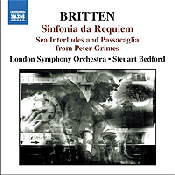For once, Simon Rattleís face doesnít dominate the cover art, nor does his name. Happily, the composer gets the largest font size, but right above his name comes that of the recording’s star, Ian Bostridge, and his thin frame fills half the cover (not easy for a slender gentleman to do), photographed in the classic ìpensive stare into the futureî pose.
Bostridge joins a fairly extensive list of tenors ñ mostly British ñ who have recorded some or all of these pieces. The composerís versions with his partner Peter Pears will never be eclipsed, but so great are these works than almost any version will have its merits. Not long ago Naxos re-released the Collins Classic recording with Philip Langridge singing the Serenade and Nocturne (reviewed here on Opera Today). So the most recent choice becomes one between a budget priced recording and this full-price release (the Naxos has Ann Murray singing Phaedra in place of Les Illuminations).
Your reviewer recommends acquiring both, if feasible. The Langridge/Bedford is warmly recorded and impeccably performed, all offered at low cost. This Bostridge/Rattle version, unsurprisingly, features state-of-the-art audio, and the special qualities of both vocalist and conductor are on ample display. Although some may take that as a warning.
As composed for Pears, these pieces do not require an ample voice, and Bostridge does not possess one. His lighter, sharply defined tenor settles right into the emotional ambiguity of the settings, carrying tinges of both irony and real sensitivity, even simultaneously. In ìBeing Beauteousî from Les Illuminations he manages some characterful low notes along with the resonant head voice many of the numbers ask for. The Serenade ìNocturne,î with its repeated refrain of ìdying,î could have a little more individual color to each iteration, but the understated effect Bostridge employs has its justification as well.
Bostridge pulled another duty for the recording: he wrote a quite interesting booklet essay. He has a thorough command of each workís creation and inspiration, and does not refrain from discussing the implications of Brittenís ìattraction to young men or boysî when of possible relevance.
Conductor Rattle has shown in his career, besides a brilliance that has taken him far, an occasional tendency to wander off into details and momentary effects. In the famous shimmering opening chords of the Serenade ìNocturne,î he adopts an aggressive, slashing attack that strikes the ear at first as fresh and vital, but might come to seem arbitrary. The Berlin Philharmonic, needless to say, performs with exquisite precision, and Radek Baborakís horn in the Serenade has a beauty others have foregone for a more sorrowful tone produced by the fragile intonation of a natural horn.
Those Berlin strings have such body and texture they begin to feel like a living organism, sighing and moaning with Bostridgeís vocal lines. Would it really be wrong to wrap oneself up in the exquisite texture they produce?
So those who have found Bostridge impressive, and the many fans apparently following all of Rattleís recorded work with the Berlin Philharmonic, will want this disc. Most of all, lovers of these exquisite Britten scores should give a listen to these often arresting performances. The booklet essay and all texts are offered in English, French, and German.
 Meanwhile, Naxos continues its re-release of Brittenís music first published on Collins Classic. The latest disc features instrumental music from two operas, Gloriana and Peter Grimes. The Sea Interludes certainly do not lack for fine recorded performances, and these have much merit, but the wonderful music from Gloriana deserves wider exposure. The suite here opens with the operaís opening tournament scene before segueing into the courtly dances, selections that are popular on some classical radio selections. Gloriana may be a problematic opera, but the suite is a delight from start to finish, something not always easy to say about Brittenís music.
Meanwhile, Naxos continues its re-release of Brittenís music first published on Collins Classic. The latest disc features instrumental music from two operas, Gloriana and Peter Grimes. The Sea Interludes certainly do not lack for fine recorded performances, and these have much merit, but the wonderful music from Gloriana deserves wider exposure. The suite here opens with the operaís opening tournament scene before segueing into the courtly dances, selections that are popular on some classical radio selections. Gloriana may be a problematic opera, but the suite is a delight from start to finish, something not always easy to say about Brittenís music.
The Sinfonia da Requiem returns to the more sober, bare style commonly associated with Britten, and Bedford and the LSO offer a powerful rendition.
Thirty years ago Britten died; these two discs indicate that his music retains its power and drama, and it will as long as artists as committed and serious as Bostridge and Rattle are drawn to it.
Chris Mullins
Los Angeles Unified School District, Secondary Literacy
image=http://www.operatoday.com/content/britten_bostridge.jpg
image_description=Britten: Serenade for Tenor, Horn and Strings; Les illuminations; Nocturne
product=yes
product_title=Benjamin Britten:
(1) Serenade for Tenor, Horn and Strings; Les illuminations; Nocturne
(2) Sinfonia da Requiem; Four Sea Interludes and Passacaglia from Peter Grimes; Symphonic Suite from Gloriana
product_by=(1) Ian Bostridge, Berliner Philharmoniker, Simon Rattle (cond.)
(2) London Symphony Orchestra, Stuart Bedford (cond.)
product_id=(1) EMI 7243 5 58049 2 1 [CD]
(2) Naxos 8.557196 [CD]